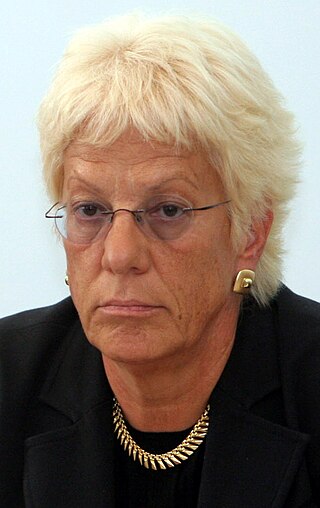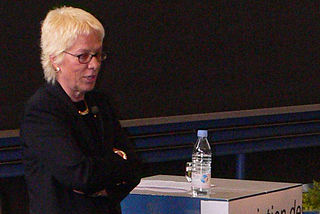
The International Criminal Tribunal for the former Yugoslavia (ICTY) was a body of the United Nations that was established to prosecute the war crimes that had been committed during the Yugoslav Wars and to try their perpetrators. The tribunal was an ad hoc court located in The Hague, Netherlands.

Carla Del Ponte is a Swiss former Chief Prosecutor of two United Nations international criminal law tribunals. A former Swiss attorney general, she was appointed prosecutor for the International Criminal Tribunal for the former Yugoslavia (ICTY) and the International Criminal Tribunal for Rwanda (ICTR) in August 1999, replacing Louise Arbour.

Hassan Bubacar Jallow is a Gambian judge who has served as Chief Justice of the Gambia since February 2017. He was the Prosecutor of the International Criminal Tribunal for Rwanda (ICTR) from 2003 to 2016, and the Prosecutor of the International Residual Mechanism for Criminal Tribunals (IRMCT) from 2012 to 2016, both at the rank of United Nations Under Secretary-General. He served as Minister of Justice and Attorney General from 1984 to 1994 under President Dawda Jawara.
The United Nations International Independent Investigation Commission (UNIIIC) was established on 7 April 2005 by Security Council Resolution 1595 to investigate the assassination of former Prime Minister of Lebanon, Rafic Hariri, who had been killed in Beirut on 14 February 2005.

United Nations Security Council resolution 827, adopted unanimously on 25 May 1993, after reaffirming Resolution 713 (1991) and all subsequent resolutions on the topic of the former Yugoslavia, approved report S/25704 of Secretary-General Boutros Boutros-Ghali, with the Statute of the International Tribunal as an annex, establishing the International Criminal Tribunal for the former Yugoslavia (ICTY).

United Nations Security Council resolution 1047, adopted unanimously on 29 February 1996, after recalling resolutions 808 (1993), 827 (1993), 936 (1994) and 955 (1994), the Council appointed Louise Arbour as Prosecutor at the International Criminal Tribunal for Rwanda (ICTR) and the International Criminal Tribunal for the former Yugoslavia (ICTY).

United Nations Security Council resolution 1126, adopted unanimously on 27 August 1997, after receiving a letter from the Secretary-General Kofi Annan, the Council endorsed his recommendation that judges Karibi-Whyte, Odio Benito and Jan, once they were replaced, finish the Čelebići case that they began before they ended their term of office. It also noted the intention of the International Criminal Tribunal for the former Yugoslavia to finish the case by November 1998.

United Nations Security Council resolution 1160, adopted on 31 March 1998, after noting the situation in Kosovo, the council, acting under Chapter VII of the United Nations Charter, imposed an arms embargo and economic sanctions on the Federal Republic of Yugoslavia, hoping to end the use of excessive force by the government.

United Nations Security Council resolution 1259, adopted unanimously on 11 August 1999, after recalling resolutions 808 (1993), 827 (1993), 936 (1994), 955 (1994) and 1047 (1996), the Council appointed Carla Del Ponte as Prosecutor at the International Criminal Tribunal for Rwanda (ICTR) and the International Criminal Tribunal for the former Yugoslavia (ICTY).

United Nations Security Council resolution 1503, adopted unanimously on 28 August 2003, after recalling resolutions 827 (1993), 955 (1994), 978 (1995), 1165 (1998), 1166 (1998), 1329 (2000), 1411 (2002), 1431 (2002) and 1481 (2003), the Council decided to split the prosecutorial duties of the International Criminal Tribunal for the former Yugoslavia (ICTY) and the International Criminal Tribunal for Rwanda (ICTR) which had previously been under the responsibility of one official, Carla Del Ponte, since 1999.

United Nations Security Council resolution 1504, adopted unanimously on 4 September 2003, after recalling Resolution 1503 (2003), the Council appointed Carla Del Ponte as Prosecutor at the International Criminal Tribunal for the former Yugoslavia (ICTY).

United Nations Security Council resolution 1505, adopted unanimously on 4 September 2003, after recalling Resolution 1503 (2003), the Council appointed Hassan Bubacar Jallow as Prosecutor at the International Criminal Tribunal for Rwanda (ICTR).

United Nations Security Council resolution 1581, adopted unanimously on 18 January 2005, after recalling resolutions 1503 (2003) and 1534 (2004), the Council approved the extension of the terms of office of seven short-term judges at the International Criminal Tribunal for the former Yugoslavia (ICTY) in order to allow them to finish adjudicating the cases on which they had been working. It was the first Security Council resolution adopted in 2005.

United Nations Security Council Resolution 1966, adopted on December 22, 2010, after recalling resolutions 827 (1993) and 955 (1994), the Council established a residual mechanism to conclude the remaining tasks of the International Criminal Tribunals for Rwanda (ICTR) and former Yugoslavia (ICTY). It was the final Security Council resolution adopted in 2010.

United Nations Security Council Resolution 1668, adopted unanimously on April 10, 2006, after recalling Resolution 1581 (2005), the Council extended the term of Judge Joaquín Canivell at the International Criminal Tribunal for the former Yugoslavia (ICTY) beyond his term of office to allow him to complete a case.

United Nations Security Council Resolution 1684, adopted unanimously on June 13, 2006, after recalling resolutions 955 (1994), 1165 (1998), 1329 (2000), 1411 (2002), 1431 (2002), 1449 (2002), 1503 (2003) and 1534 (2004) concerning the International Criminal Tribunal for Rwanda (ICTR), the Council extended the terms of 11 judges beyond their expiry dates in order for them to complete the trials in which they were sitting.

United Nations Security Council Resolution 1786 was unanimously adopted on 28 November 2007.

United Nations Security Council Resolution 1800 was unanimously adopted on 20 February 2008.
United Nations Security Council Resolution 1877 was unanimously adopted on 7 July 2009.
United Nations Security Council Resolution 1849 was unanimously adopted on 12 December 2008.

















